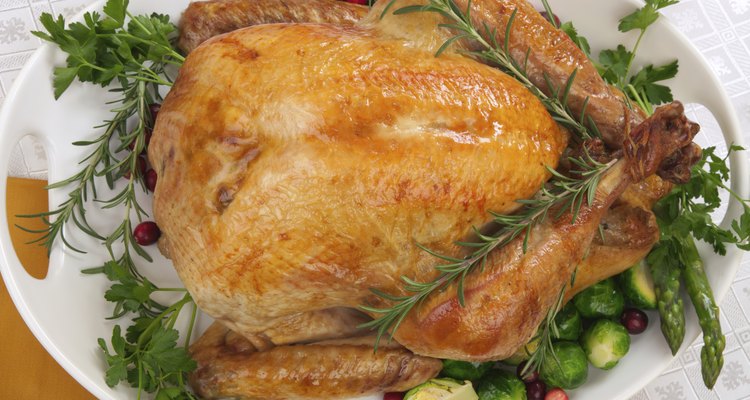
evgenyb/iStock/Getty Images
Properly defrosting a turkey prevents the growth of dangerous bacteria and reduces your risk of foodborne illness. Perishable turkey meat should not be left in the danger zone of 40 to 140 degrees Fahrenheit. Cook your turkey immediately after you thaw it to avoid spoilage and maintain the safety of the meat.
Counter Thawing
Avoid thawing a turkey on the counter, on the back porch or any place where the temperature rises above 40 F. Bacteria flourish in temperatures between 40 and 140 F, and cooking the bird may not kill them.
Refrigerator
Your refrigerator is the safest place to thaw a turkey because the cold temperature prevents the growth of bacteria. Place the wrapped turkey on a tray and put it in the refrigerator. The tray should have at least 1-inch sides so that as the bird thaws, the resulting liquid remains in the tray and does not contaminate your refrigerator. The bird's weight determines how much time it takes to thaw; plan on about 24 hours for every 5 pounds of turkey. Thus, a 15-pound turkey takes about three days to thaw in the refrigerator.
Cold Water Soak
You can defrost a turkey in cold water more quickly than in the refrigerator, but it requires use of the sink and your attention every 30 minutes. Ideally, the water temperature should be below 40 F. With the bird still in its packaging, place it in a sink full of cold tap water. Drain and refill the sink with cold water every 30 minutes; do not use warm or hot tap water because it promotes the growth of bacteria. Thawing takes about 30 minutes of soaking for each pound of turkey.
Microwave
Small turkeys can be defrosted in a microwave. Microwave ovens vary in power, so check the manufacturer’s instruction manual for your microwave oven to find out the power level and time it will take to defrost your turkey. Turkey defrosted in a microwave must be cooked immediately because the microwave may have caused hot pockets in the turkey that have become cooked, and because the turkey is warmed, it can become a breeding ground for bacteria.
Related Articles
Is It Safe to Leave a Turkey at Room ...

Do You Need to Defrost Chicken Wings ...
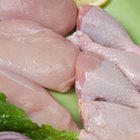
How to Soak Chicken in Cold Water

How to Cook a Turkey From Frozen
How Long to Thaw a Frozen Turkey

Can You Defrost Hamburger in Hot Water?

How to Defrost a Chicken in a ...

Food Safety Tips for Frozen Pork

Thawing Lobster Tails

How to Roast a Split Turkey

How Long Can Meat Stay out of the ...
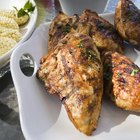
Can I Cook a Chicken Five Days After ...
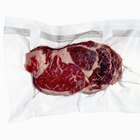
How to Defrost a Frozen Beef Roast in ...
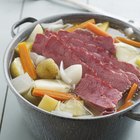
How to Cook a Large Amount of Corned ...
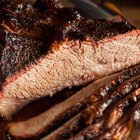
How to Steam a Brisket of Beef
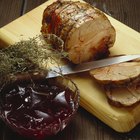
Can I Leave a Frozen Pork Roast out ...

How to Reheat Lasagna

How Long Can Frozen Food Sit Out Before ...

Do You Thaw Hamburger Patties Before ...
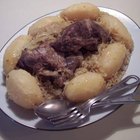
How to Cook a Boneless Sirloin Pork ...
References
Writer Bio
Elizabeth Yetter has been writing about food and gardening since 2006. She currently resides in the heart of Pennsylvania German country where she has learned traditional recipes and farming techniques. She currently writes Kindle books about local and worldwide superstitions.
Photo Credits
evgenyb/iStock/Getty Images